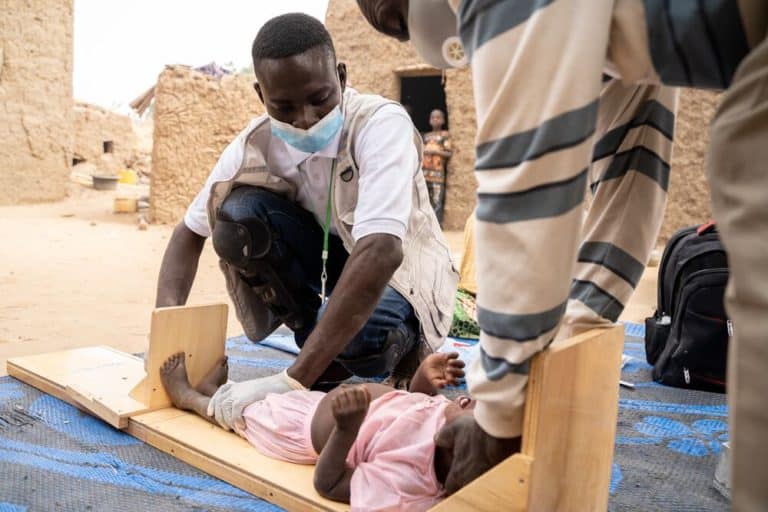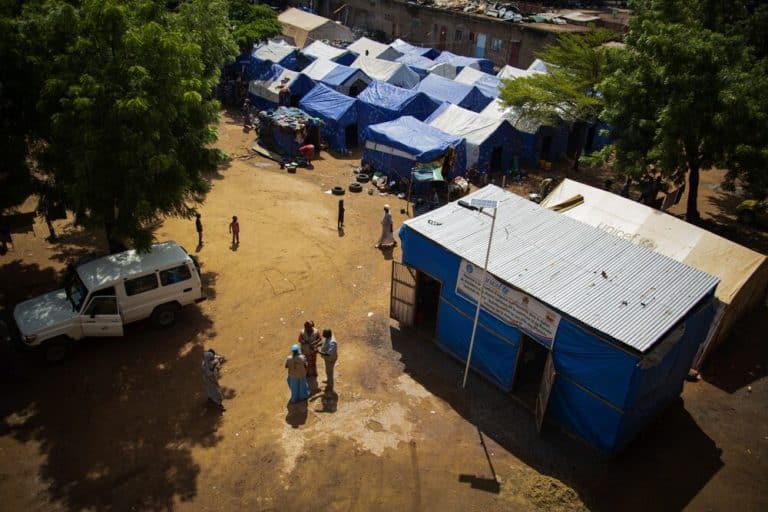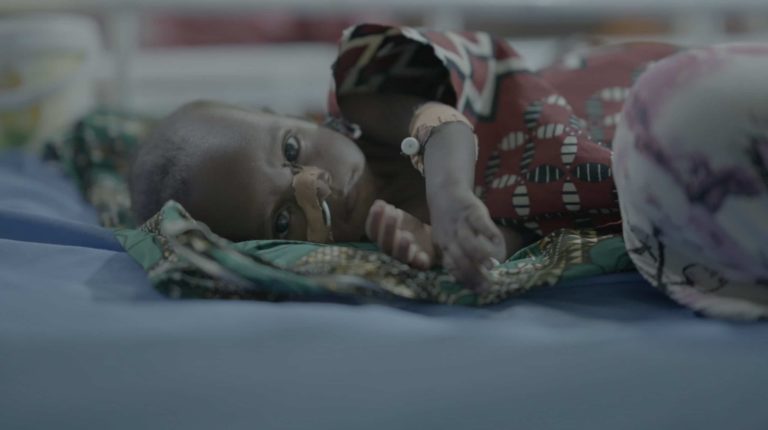Can you briefly explain what the “MUAC for Mothers” strategy is?
The “MUAC for Mothers” strategy trains mothers and other caregivers, such as grandparents, uncles or aunts to use a simple and effective tool called the mid-upper arm circumference (MUAC) bracelet to detect early signs of malnutrition in their children under five.
A pilot study, conducted in 2012 by ALIMA which followed some 12,000 mothers in the district of Mirriah in Niger, showed that more than 77% of mothers trained in the “MUAC for Mothers” technique correctly identified the nutritional status of their children. This is comparable to the performance of community health workers, who are normally tasked with using the MUAC to screen for malnutrition in children.
As more mothers now screen their own children in their homes and communities, it means that many more children are being checked for malnutrition and more cases are being detected early. This reduces the risk of mortality linked to malnutrition in a way that periodic visits from community health workers are unable to do. Put simply, mothers and other family carergivers are the best people to detect early signs of malnutrition.
What are the challenges of integrating the “MUAC for Mothers” strategy into programs against malnutrition in Mali?
Mali, like many countries in the Sahel region, has high rates of malnutrition. In 2015, the overall malnutrition rate in the country was 12.4%. The rate of moderate acute malnutrition was 9.6%, and the rate of severe acute malnutrition was 2.8%. Reducing the level of morbidity and malnutrition-related mortality is therefore a major public health issue.
The community health worker program in Mali is designed to identify needs in remote communities, but it often faces structural problems that make malnutrition screening work difficult. In contexts where community health workers are not consistently present in a community, the “MUAC for Mothers” strategy could make real progress in the fight against malnutrition.
There is currently no standard approach to training mothers in how to use the MUAC tape to screen their children for malnutrition. To address this, we must work with our health and humanitarian partners to develop strategies for different locations. For example, we must define whether the “MUAC for Mothers” strategy is an independent project or whether it should be paired with other programs (e.g. vaccination campaigns, supplementary feeding programs, Seasonal Malaria Chemoprevention etc.). Individual and group training sessions also need to be defined.
A meeting in Bamako on November 1 with Malian health authorities and humanitarian partners helped to answer some of these questions and generated useful exchanges based on ALIMA-AMCP’s experience. As a result, we have established a set of recommendations that represent a significant step in adopting the “MUAC for Mothers” strategy at a national level by health authorities.
How is ALIMA-AMCP implementing the “MUAC for Mothers” strategy in its projects in Mali?
Since 2011, ALIMA has worked alongside AMCP, a Malian medical organization dedicated to making healthcare more accessible and reducing malaria-related mortality. In 2015, ALIMA-AMCP began to train mothers in the intensive nutritional rehabilitation units of eight referral health centers. Six referral centers are in the region of Koulikoro and two in the Timbuktu region. This year we have extended our activity by training mothers at the community level via the Ambulatory Nutrition Units we support in Koulikoro. Since 2015, ALIMA-AMCP has trained more than 10,000 mothers to detect early signs of malnutrition. This is contributing to the reduction of mortality among children under five who are suffering from malnutrition in Mali.
The “MUAC for Mothers” strategy is a project funded by the European Commission’s Humanitarian Aid and Civil Protection department (ECHO).
Since 2011, ALIMA has worked with the Medical Alliance Against Malaria (AMCP), a Malian medical non-profit organization dedicated to making healthcare more accessible and reducing malaria-related mortality. ALIMA and AMCP support 33 community health centers and two referral health centers – including an operating room – in the Diré and Goudam districts in the Timbuktu region, providing free access to care. In the Goudam district, medical teams in mobile clinics provide medical care and clean water to displaced people. In 2015, nearly 170,000 consultations, 5,000 hospitalizations, 3,600 births, and 522 surgical procedures were recorded in the Timbuktu region.
In the Koulikoro region, ALIMA and its local partners are working hard to reduce deaths from the leading causes of infant mortality, including malaria, acute respiratory infections, diarrhea and malnutrition. The teams also support 111 community health centers and six referral health centers. Seasonal Malaria Chemoprevention (SMC) campaigns were organized during the rainy season to help prevent malaria.
In Dioïla, in southern Mali, ALIMA also opened an intensive nutritional rehabilitation unit to train Malian healthcare workers. They learn to screen for severe acute malnutrition with complications and how to manage it in a hospital setting. To date, this project has provided training to 276 nurses and doctors.
Copyright Xaume Olleros



